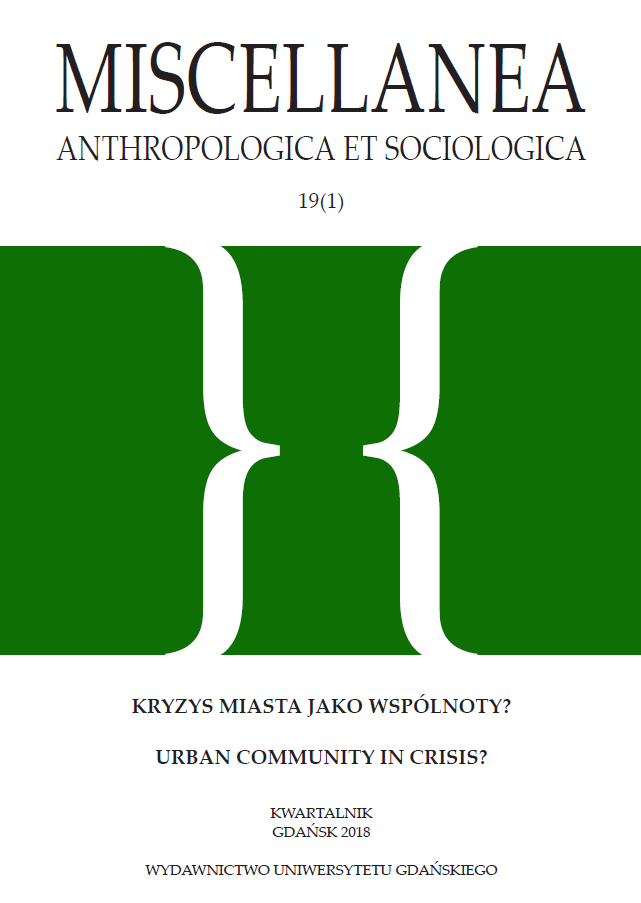Od zawężenia do rozszerzenia wspólnoty. Od współdzielenia do wykluczenia. Koncepcja inteligentnego miasta a ważne wyzwania dla wspólnoty miejskiej
DOI:
https://doi.org/10.26881/maes.2018.1.09Słowa kluczowe:
miasto inteligentne, wspólnota, sprawstwo, gospodarka współdzielenia, AirbnbAbstrakt
Tekst odnosi się do popularnego paradygmatu miasta inteligentnego, by zaprezentować wizje i wyzwania, jakie niesie on dla miejskich wspólnot. Autor nie odwołuje się do wyraźnie krytycznych aspektów kontroli czy korporacyjnego charakteru projektów spod znaku smart city, a koncentruje się na potencjałach i wyzwaniach, jakie niesie dla wspólnot miejskich i dla samych badaczy miejskich. W tym kontekście opisuje szerzej dwie kwestie: rozszerzenia wspólnoty miejskiej oraz gospodarki współdzielenia.
Downloads
Bibliografia
Collon M., 1991 Techno-economic networks and irreversibility [w:] J. Law (ed.), A Sociology of Monsters: Essays on Power, Technology and Domination, London: Routledge.
Farber D., 2013, Counting the internet of things in real time. C|Net, http://news.cnet.com/8301-11386_3-57596162-76/counting-the-internet-of-things-in-real-time/ (dostęp: 6.10.2016).
Gądecki J., 2016, Miasto sprytne czy inteligentne?, Autoportret, nr 13(52).
Germann Molz J., Gibson S., 2007, Introduction: Mobilizing and mooring hospitality [w:] iidem (eds.), Mobilizing Hospitality: The Ethics of Social Relations in a Mobile World, Aldershot: Ashgate.
Haque U., 2012, What is a city that it would be ‘smart’? Volume #34: City in a Box, http://volumeproject.org/blog/2012/12/21/volume-34-city-in-a-box/ (dostęp: 1.03.2016).
Jessop B., 1994, The transition to post-Fordism and the Schumpterian workfare state [w:] R. Burrows, B. Loader (eds.), Towards a Post-Fordist Welfare State, London: Routledge.
Kahn M.E., 2010, Climatopolis: How Our Cities Will Thrive in a Hotter Future, New York: Basic Books.
Kitchin R., Dodge M., 2011, Code/Space. Software and Everyday Life, Cambridge: MIT Press.
Konings H., 2009, Latte Macchiato, Tielt: Lannoo.
Latour B., 1996, Aramis, or the Love of Technology, Cambridge: Harvard University Press.
Latour B., 2004, Nonhumans [w:] S. Harrison, S. Pile, N. Thrift (eds.), Patterned Ground: Entanglements of Nature and Culture, London: Reaktion Books.
McLaren D., Agyeman J., 2015, Sharing Cities. A Case for Truly Smart and Sustainable Cities, Cambridge: MIT Press.
McNeill D., 2016, Governing a city of unicorns: Technology capital and the urban politics of San Francisco, Urban Geography, no. 37(4).
Mitchell W.J., 2006, Smart City 2020, Metropolis, 20.03.2006, http://www.metropolismag.com/story/20060320/smart-city-2020 (dostęp: 12.12.2015).
Osnos E., 2017, Doomsday prep for the super-rich, New Yorker, 30.01.2017.
Purcell M., 2003, Citizenship and the right to the global city: Reimagining the capitalist world order, International Journal of Urban and Regional Research, no. 27(3).
Sans A.A., Domínguez A.Q., 2016, Unravelling Airbnb: Urban perspectives from Barcelona [w:] A.P. Rude, G. Richards (eds.), Reinventing the Local in Tourism: Producing, Consuming and Negotiating Place, Aspects of Tourism, vol. 73.
Vanolo A., 2016, Is there anybody out there? The place and role of citizens in tomorrow’s smart cities, Cities, vol. 82.

 Uniwersyteckie Czasopisma Naukowe
Uniwersyteckie Czasopisma Naukowe




